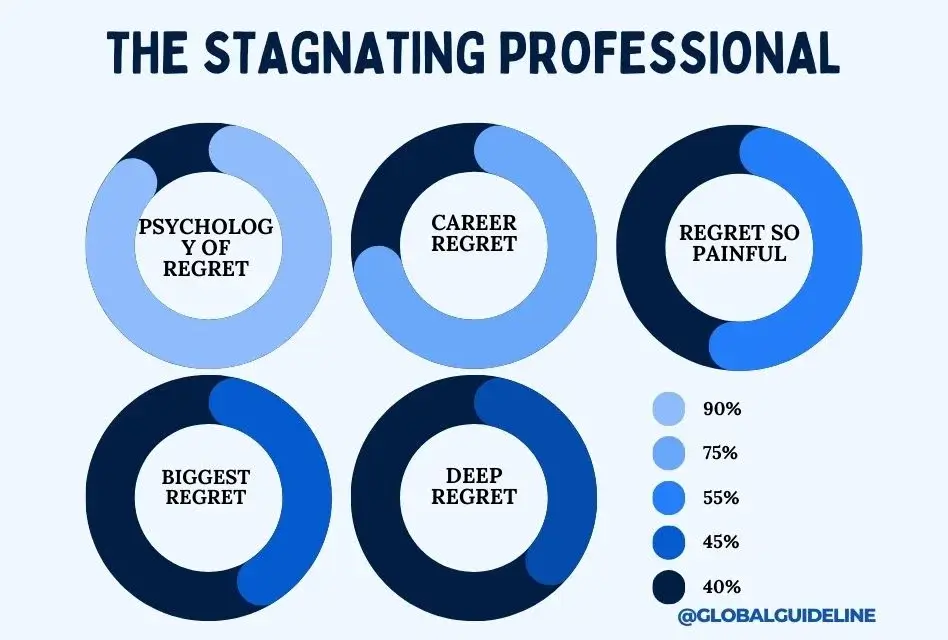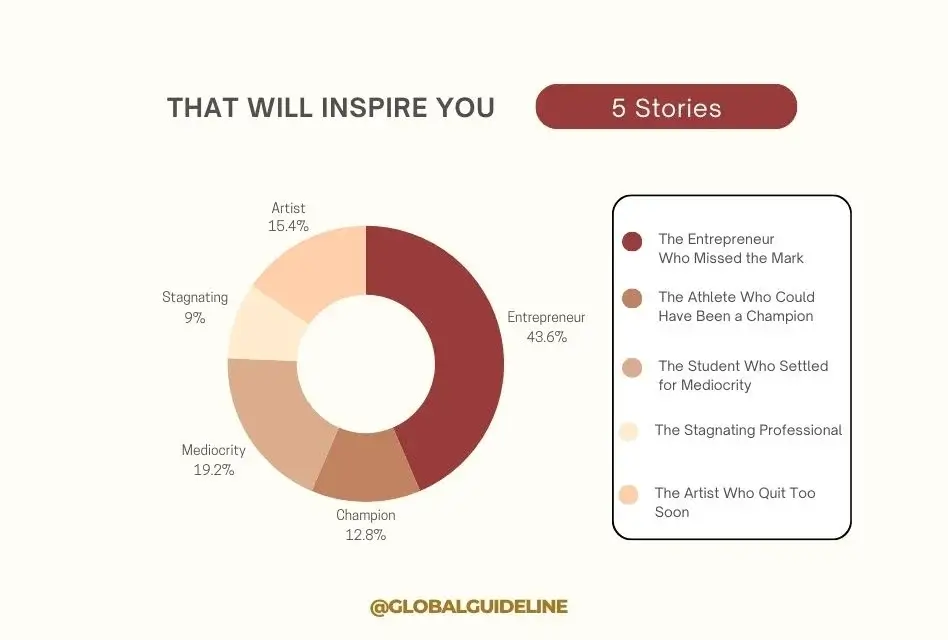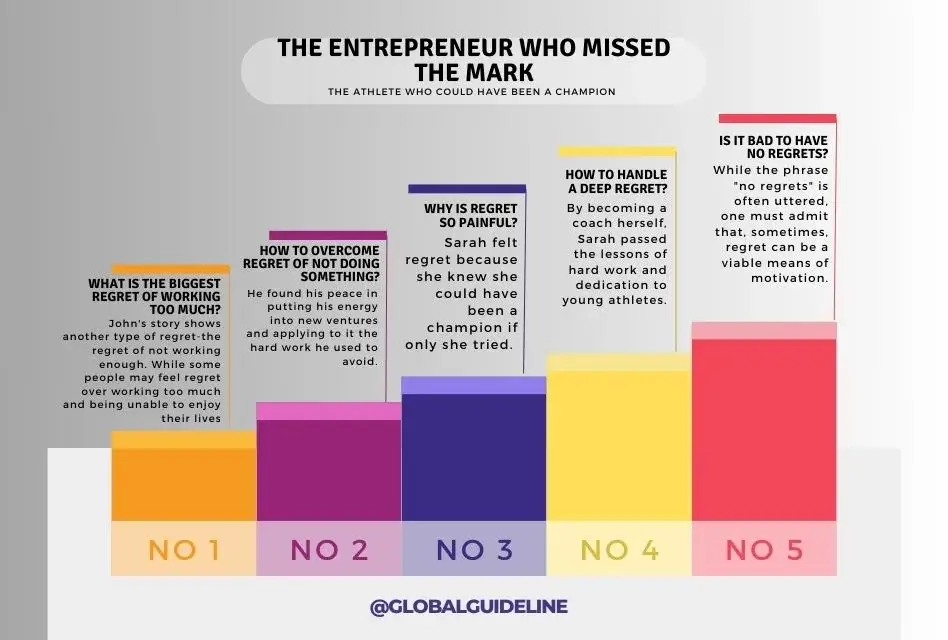Regret, for one thing, is probably one of the most powerful emotions in the world, gnawing at us when we reflect on those roads not traveled or efforts not extended. The question echoes within their minds: “Does anyone regret not working harder?” images of missed opportunities and potential that could never be tapped or developed. We go on to discuss five gripping tales of individuals who had to live with the consequences of not working harder and how such experiences defined their lives. These stories will not only inspire you to push beyond your limits but will also give insights into dealing with the regret of not giving one’s best at a time when it really matters.
Table of Contents

1. The Entrepreneur Who Missed the Mark
John was a budding entrepreneur with a revolutionary idea. While he knew what his idea was capable of achieving, he also knew that to see it through would take unbridled effort. Yet, John often found himself procrastinating, assuming that success would someday come, not requiring him to work hard daily. Years later, another entrepreneur came up with a similar idea and made it very successful. John had to live with the painful feeling that, with harder work, he could have been reaping those rewards.
What Is the Biggest Regret of Working Too Much?
John’s story shows another type of regret-the regret of not working enough. While some people may feel regret over working too much and being unable to enjoy their lives, others, like John, regret not doing what was required when it was the right time. The conclusion is very clear here: if you do not work, then good results are not going to come.
How to Overcome Regret of Not Doing Something?
He found his peace in putting his energy into new ventures and applying to it the hard work he used to avoid. One of the ways to overcome regret is through learning from the past and dedicating oneself to making better choices in the future.
2. The Athlete Who Could Have Been a Champion
This is a story about Sarah, a gifted high school athlete at the national championship level. However, she never practiced seriously and frequently missed training sessions. Her coach kept telling her how talent was never good enough, but Sarah paid little attention. Then came the day when she was supposed to run at the national level, and as expected, she rose to the occasion. She felt hard-hitting regret from seeing others-less naturally gifted, but more dedicated-receive the medals.
Why Is Regret So Painful?
Sarah felt regret because she knew she could have been a champion if only she tried. The reason regret hurts so much is that it confronts us with our failings and the opportunities slipped right through our fingers.
How to Handle a Deep Regret?
By becoming a coach herself, Sarah passed the lessons of hard work and dedication to young athletes. She turned her regret into her mission-to help others not to make the very same mistake.
3. The Student Who Settled for Mediocrity
Mike was a brilliant student with big ambitions: he wanted to go to the most prestigious university. However, he never chose homework over hanging out with friends and thought he could make it through with minimal effort. When it came time to apply to college, Mike found his options were limited compared to what he had planned. Although he got into a good enough school, it wasn’t the one he had aimed for. He carried the regret of not having worked harder in high school throughout his college years.
What Is the Most Common Regret?
One such regret, as Mike experiences, is not trying more at school or work. Many individuals in life regret the fact that they didn’t take their education or work seriously enough.
Is It Bad to Have No Regrets?
While the phrase “no regrets” is often uttered, one must admit that, sometimes, regret can be a viable means of motivation. The regret here drove Mike to be exceptional in college-so that, at least this time around, he wouldn’t mess it up.
4. The Stagnating Professional
Emma was a career-oriented person; she had joined the professional world with a lot of enthusiasm. With time, however, she became content with doing just enough to get by in the workplace. She sat around and watched her colleagues become promoted and receive raises while she herself continued to remain at the same level. It wasn’t long after that this regret of not trying harder to advance placed Emma at a point of radical change.
What Is the Psychology of Regret?
It is said that in most cases, regret encompasses feelings of guilt, shame, and self-blame. In this case, Emma’s regret at not pushing for more in her career to be taken to deep reflective consideration and transformation.
How to Handle Career Regret?
She also sought extra training for herself to handle more responsibilities at her workplace. The story of Emma is a lesson to learn that one is never too old to relight the fire of passion and climb the ladder of success.
5. The Artist Who Quit Too Soon
Tom had big dreams of being a professional artist job: talented and in love with the work, yet consistently so discouraged by the blows dealt by the art world. After a few rejections, Tom called it quits, thinking he wasn’t good enough. Years later, he would regret not fighting harder to overcome those obstacles in his way of pursuing his passion.
Does Rejection Get Any Easier?
One faces rejection down just about any creative path, and it doesn’t really get any easier; it just becomes more tolerable with time and experience. In the case of Tom, his regret was magnified by the fact that he allowed rejection to decide his path.
How to Get Over the Regret of Giving Up?
Tom eventually returned to his art, this time full-time. He realized that the only way to triumph over regret is by doing just one thing: continuing on, no matter how difficult the journey may be. His story reminds us of the hard work required in any type of dream.

Regret Dealing: Common Interview Questions
Any question that has to do with regret in a job interview should be framed positively by you. Here are some common ones and how to answer them:
- Have you ever regretted not putting more effort into a project?
“Yes, once I regretted not putting enough effort into one project that could have promoted my career by leaps and bounds. But I picked up a great lesson, and today I apply the very best ethic and dedication to any projects at hand.” - How would you handle past decision regrets?
“I believe regret is part of life, but one should learn from it. I always reflect on my choices, trying to think through what went wrong; these thoughts help me improve my performance later on.” - How did you overcome regrets in your career?
“I have taken steps toward any career regrets by looking into new opportunities for growth and development. I also make sure to set concrete goals and work diligently in attaining them.”
These questions give you an opportunity to express how your previous experiences can serve as a learning curve and a dedication to constant growth.
FAQs
How to Overcome Regret of Not Doing Something?
To be able to get over regret, it will be important that any lesson learned from it is put to use in the time to come. You let go of the regret by focusing on what you can control and proactively working on improving your situation.
What is the Biggest Regret for Working Too Much?
The most common regret that comes with working too much often pertains to how this has resulted in not being able to capitalize on opportunities to be with loved ones or simply pursue interests of personal interest. This can be a very common regret, though balance between work and life can keep it from occurring.
What Is the Most Common Regret?
The regret of not pursuing dreams or goals as desired might well be one of the most common regrets. Through many, this habit of looking back and wishes for hard work or taking risks while they have it in their power begin.
How to Deal with Deep Regret?
Dealing with deep regret means coming to accept the past, forgiving oneself, and being able to concentrate on what one can do to make a better future. It is also helpful to seek the support of friends, family, or a therapist in such cases.
Why Is Regret So Painful?
Regret becomes painful because it forces us to face our perceived failures and missed opportunities. It tends to breed feelings of guilt, shame, and self-doubt; hence, it is quite troublesome to deal with.
What Is the Psychology of Regret?
Regret is a model of thought and feeling that considers reflections on past actions or choices and their consequences. Mostly, when such thoughts crop up, there is usually a yearning for one to go back in time to make amendments, which is impossible, hence distressing.
If You Don’t Work Hard There Won’t Be Good Results?
This statement brings out that it is only through hard work that success could be realized. Without putting in the necessary effort, it’s unlikely that you’ll achieve the desired outcomes, leading to potential regret in the future.
Does Rejection Get Easier?
Rejection does not get particularly easier, but individuals can build resilience over time, learning to cope with or deal with rejections a little better.
Is It Bad to Have No Regrets?
Yet, even though some would argue that one should never have regrets in life, regret itself is often a very good teacher. It is what often drives us to make better choices, and not to continue further with mistakes we once made.

Conclusion
Regret is essentially an emotion most of us will inevitably face at some time in our lives, whether it’s due to missed opportunities, unfulfilled potential, or not working hard enough. The question often arises: “Does anyone regret not working harder?” The different stories in this article illustrate how profoundly regret can impact people. Yet, each story also shows how acknowledging and learning from regret can serve as a catalyst for positive change. By embracing these regrets, individuals can propel themselves forward, committing to work harder and aim higher. It’s never too late to start striving for a better future. Do your best, and you will never regret it.










